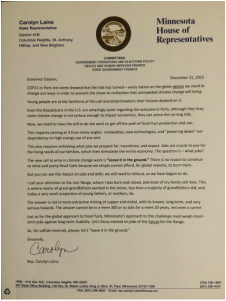
Governor Dayton,
COP21 in Paris last week showed that the tide has turned – every nation on the globe agrees we need to change our ways in order to prevent the chaos to civilization that unimpeded climate change will bring.
Young people are at the forefront of this call and determination; their futures depend on it.
Even the Republicans in the U.S. are amazingly quiet regarding the outcome in Paris; although they may claim climate change is not serious enough to impact economics, they can sense the turning tide.
Now, we need to have the will to do the work to get off the path of fossil fuel production and use.
This requires coming at it from many angles: renewables, new technologies, and “powering down” our dependency on high energy use of any sort.
This also requires rethinking what jobs we prepare for, incentivize, and expect. Jobs are crucial to pay for the living needs of our families, which then stimulates the entire economy. The question is – what jobs?
The new call to arms in climate change work is “Leave it in the ground.” There is no reason to continue to mine and pump fossil fuels because we simply cannot afford, for global reasons, to burn them.
But you can see the impact on jobs and skills: we will need to refocus, as we have begun to do.
I call your attention to the Iron Range, where I was born and raised, and most of my family still lives. This is where nearly all great-grandfathers worked in the mines, less than a majority of grandfathers did, and today a very small proportion of young fathers, or mothers, do.
The answer is not in more extractive mining of copper and nickel, with its known, long-term, and very serious hazards. The answer cannot be in a mere 300 or so jobs for a mere 20 years, not even a career.
Just as for the global approach to fossil fuels, Minnesota’s approach to this challenge must weigh short-term jobs against long-term livability. Let’s focus instead on jobs of the future for the Range.
So, for sulfide minerals, please, let’s “leave it in the ground.”
Sincerely,
Rep. Carolyn Laine
COP21 in Paris last week showed that the tide has turned – every nation on the globe agrees we need to change our ways in order to prevent the chaos to civilization that unimpeded climate change will bring.
Young people are at the forefront of this call and determination; their futures depend on it.
Even the Republicans in the U.S. are amazingly quiet regarding the outcome in Paris; although they may claim climate change is not serious enough to impact economics, they can sense the turning tide.
Now, we need to have the will to do the work to get off the path of fossil fuel production and use.
This requires coming at it from many angles: renewables, new technologies, and “powering down” our dependency on high energy use of any sort.
This also requires rethinking what jobs we prepare for, incentivize, and expect. Jobs are crucial to pay for the living needs of our families, which then stimulates the entire economy. The question is – what jobs?
The new call to arms in climate change work is “Leave it in the ground.” There is no reason to continue to mine and pump fossil fuels because we simply cannot afford, for global reasons, to burn them.
But you can see the impact on jobs and skills: we will need to refocus, as we have begun to do.
I call your attention to the Iron Range, where I was born and raised, and most of my family still lives. This is where nearly all great-grandfathers worked in the mines, less than a majority of grandfathers did, and today a very small proportion of young fathers, or mothers, do.
The answer is not in more extractive mining of copper and nickel, with its known, long-term, and very serious hazards. The answer cannot be in a mere 300 or so jobs for a mere 20 years, not even a career.
Just as for the global approach to fossil fuels, Minnesota’s approach to this challenge must weigh short-term jobs against long-term livability. Let’s focus instead on jobs of the future for the Range.
So, for sulfide minerals, please, let’s “leave it in the ground.”
Sincerely,
Rep. Carolyn Laine
 RSS Feed
RSS Feed